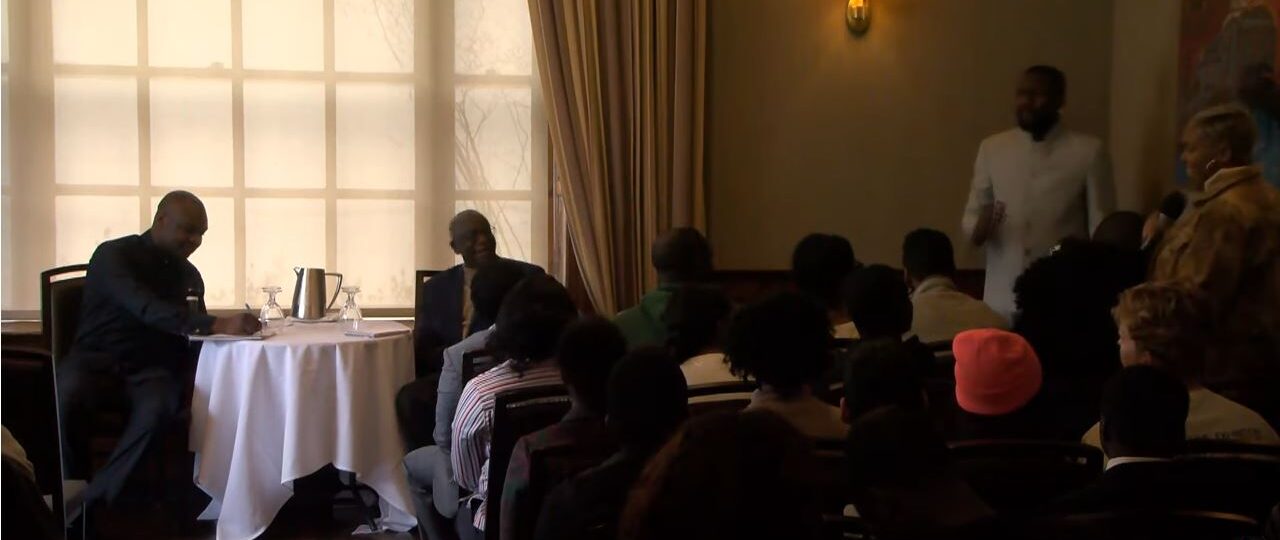Beyond Prestige: How Apostle Selman’s Harvard Lecture Redefines Influence
At Harvard University, a significant event took place that brought into focus the impact of religion on society and challenged ideas about prestige and influence. The Program on Biblical Law and Christian Legal Studies, together with The Center for the Study of African Studies and Economies (CSASE), hosted a leadership summit featuring Apostle Joshua Selman, the President and CEO of Koinonia Global Ministries. The summit was not just another academic meeting; it was a deep dive into how faith and leadership intersect and influence society’s resilience. Apostle Selman’s talk, “The Role of Religion in Resilient Societies: Lessons from Africa’s Development Journey,” aimed to share lessons from Africa’s diverse and resilient communities.
While some people saw Selman’s invitation to speak at Harvard as a prestigious honor, highlighting his influence, this view overlooks what is truly important. The event’s real value wasn’t about boosting Selman’s profile but about Harvard’s willingness to open up to religious discussions, specifically the Christian faith. This moment was less about personal accolades for Selman and more about the importance of such discussions at esteemed academic institutions like Harvard. In this blog post, we’re going to look beyond the surface of prestige and explore how the gospel can play a role in all areas of society, including the academic world.
Background on Apostle Joshua Selman
Apostle Joshua Selman Nimmak, more commonly known as Apostle Selman, stands as a figure of profound spiritual depth and insight in the Christian community. His journey is not just one of religious significance but also of impactful leadership and profound influence on lives across the globe. As the founder of Koinonia Global Ministries, formerly known as Eternity Network International (ENI), Selman has dedicated his life to the spiritual development of believers, emphasizing deep communion with God, character transformation, and the demonstration of the power of the Holy Spirit.
Early Life and Calling
Born in Jos, Plateau State, Nigeria, Selman’s early life was marked by a deep hunger for spiritual truths and the workings of God’s power. His pursuit of spiritual understanding and the manifestation of the Holy Spirit’s gifts became the bedrock upon which Koinonia was founded in March 2011. Koinonia, a word that signifies communion, fellowship, or partnership, perfectly encapsulates Selman’s vision—a body of believers coming together to experience the realness of God through worship, teaching, miracles, and profound spiritual insights.
Koinonia Global Ministries: A Beacon of Light
Under Selman’s leadership, Koinonia Global Ministries has grown exponentially, extending its reach beyond the city of Zaria in Kaduna State, Nigeria, to a global audience. Through weekly fellowship meetings, monthly miracle services, and a vast array of teaching resources, Selman has touched the lives of millions. His teachings, rich in wisdom and practical biblical principles, are disseminated widely through various media platforms, making him one of the most influential Christian leaders of his generation.
A Sought-After Speaker
Selman’s reputation as a dynamic speaker and a man of God’s presence precedes him. His invitations to speak at churches, conferences, and now prestigious academic institutions like Harvard University are a testament to the universal relevance and appeal of his message. His teachings transcend cultural, denominational, and even religious boundaries, drawing interest from diverse audiences worldwide.
The Role of Religion in Resilient Societies
The lecture at Harvard, titled “The Role of Religion in Resilient Societies: Lessons from Africa’s Development Journey,” offered attendees a unique perspective on the intertwining of faith and societal development. Selman’s insights, drawn from the rich mix of African societies where religion plays a central role in community life, governance, and resilience, shed light on the often underappreciated dimension of religion in shaping societies that can withstand and thrive amidst challenges.
Religion as a Source of Resilience
In his lecture, Selman might have explored how faith communities across Africa have contributed to resilience in the face of socio-economic challenges, political instability, and external pressures. Drawing from biblical principles, he likely emphasized the role of religion not just in providing spiritual solace but in fostering community cohesion, ethical leadership, and social justice.
- Jeremiah 29:7 – “But seek the welfare of the city where I have sent you into exile, and pray to the Lord on its behalf, for in its welfare you will find your welfare.” This verse encapsulates the essence of Selman’s message, highlighting the biblical mandate for believers to actively contribute to the prosperity and resilience of their societies.
The Misconception of Prestige in Preaching
In the aftermath of Apostle Joshua Selman’s lecture at Harvard, discussions swirled around the perceived prestige of such an invitation, suggesting it marked a significant milestone or validation of Selman’s ministry. However, this perspective, while understandable from a worldly standpoint, overlooks a fundamental truth of the Christian faith—the value of preaching the gospel is not contingent upon the earthly stature of the platform but on the faithfulness to God’s call to disseminate His word to all people, regardless of their social or economic status.
Prestige vs. Purpose in the Christian Ministry
The allure of prestigious platforms can sometimes cloud the true purpose of Christian ministry. The Bible, however, offers a starkly different view on the matter, emphasizing that the worth of one’s ministry is not measured by the grandeur of its stage but by its faithfulness to the divine commission.
- James 2:1-9 offers a caution against showing favoritism, reminding believers that God’s kingdom does not operate on worldly hierarchies or distinctions. This passage challenges the notion that an opportunity to preach at a prestigious institution like Harvard inherently holds more value than ministering to a small, impoverished community. In God’s eyes, each soul is precious, and the gospel is to be shared with all, irrespective of their worldly status.
- Luke 4:18-19 records Jesus proclaiming His own mission, which was to preach good news to the poor, proclaim freedom for the prisoners, and set the oppressed free. Jesus’ ministry focused on those society often overlooked, emphasizing that the kingdom of God is accessible to all, especially the marginalized and disenfranchised. This serves as a model for Christian ministry, highlighting the importance of reaching out to all corners of society.
Equality of Audience in God’s Eyes
The essence of the gospel is its universality—the good news is meant for every individual, regardless of their background, education, or social standing. Apostle Selman’s preaching at Harvard, therefore, should not be seen as a step up in prestige but as another expression of obedience to the Great Commission outlined in Matthew 28:19-20, which commands believers to make disciples of all nations, teaching them to obey everything Jesus has commanded.
The Real Victory: Harvard’s Openness to the Gospel
The focal point of Apostle Joshua Selman’s engagement at Harvard shifts from the elevation of an individual to the broader, more impactful narrative of a prestigious academic institution opening its doors to the Christian message. This openness signifies a victory for the gospel, demonstrating its power to transcend intellectual barriers and enter spaces traditionally reserved for secular or academic discourses.
Impact on the Academic Community
Harvard’s invitation to a Christian leader like Selman to speak on religion and societal resilience is a testament to the enduring relevance of spiritual perspectives in addressing global challenges. This engagement offers a platform for meaningful dialogue between faith and academia, encouraging scholars and students alike to consider the integral role of spirituality in human development and societal wellbeing.
- Mark 16:15, where Jesus instructs His followers to “go into all the world and preach the gospel to all creation,” reinforces the significance of such opportunities. The command underscores the necessity of bringing the Christian message to every sphere of human activity, including academic institutions where future leaders are shaped.
A Call to Value All Opportunities to Share the Gospel
This narrative urges believers to appreciate and seize every opportunity to share the gospel, reminding them that every act of witnessing, regardless of the audience’s perceived prestige, is valuable in God’s kingdom. It challenges the Christian community to look beyond societal accolades and focus on the mission to spread the gospel’s transformative power everywhere.
Conclusion
The engagement of Apostle Joshua Selman at Harvard University serves as a powerful reminder that the value of preaching the gospel lies not in the worldly prestige of the platform but in the obedience to God’s call to share His message with all people. This event underscores the significance of Harvard’s openness to the gospel, marking a notable moment for spiritual discourse in academic settings. It is a call to believers everywhere to recognize the importance of every opportunity to share or hear the gospel, reaffirming that in the eyes of God, no audience is too small, no platform too humble, and every soul is worth reaching.

